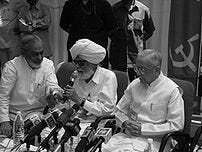Harkishan Singh Surjeet finally leaves the stage: Thank God for small mercies!

Image via Wikipedia
The Indo-China War of 1962 remains a watershed in Indian politics – internally. It was again, in modern India, that its own leaders – and traitors – openly betrayed the fighting jawan on the front. The very guy who was responsible for their well-being while he gave up his life was betrayed open and unashamedly.
During the war, a faction of the Indian communists backed the position of the Indian government, while other sections of the party claimed that it was a conflict between a socialist and a capitalist state, and thus took a pro-Chinese position. There were two factions in the party – leftists and nationalists.
Leftists
supported the Chinese stand where as the
Nationalists
backed India.
China Supporters included: B. T. Ranadive, P. Sundarayya, P. C. Joshi, Basavapunnaiah, Jyoti Basu, and Harkishan Singh Surjeet.
The perfidy of the Indian Communists and their non-chalance was un-paralleled ever in the history of India’s betrayal! Mind you this meeting below – where the rift of the Communists widened and 32 “prominent” communists walked out – was in APRIL 1964. India was still reeling under the after effects of defeat by China in the 1962 War (October 10 – November 21, 1962). That was the backdrop of this convention.
At a CPI National Council meeting held on April 11, 1964, 32 Council members walked out in protest, accusing Dange and his followers of “anti-unity and anti-Communist policies”.
The leftist section, to which the 32 National Council members* belonged, organised a convention in Tenali, Andhra Pradesh July 7 to 11. In this convention the issues of the internal disputes in the party were discussed. 146 delegates, claiming to represent 100,000 CPI members, took part in the proceedings. The convention decided to convene the 7th Party Congress of CPI in Calcutta later the same year.
Marking a difference from the Dangeite sector of CPI, the Tenali convention was marked by the display of a large portrait of the Chinese Communist leader Mao Zedong.
At the Tenali convention a Bengal-based pro-Chinese group, representing one of the most radical streams of the CPI left wing, presented a draft programme proposal of their own. These radicals criticised the draft programme proposal prepared by M. Basavapunniah for undermining class struggle and failing to take a clear pro-Chinese position in the ideological conflict between the CPSU and CPC.
The 32 were P. Sundarayya, M. Basavapunniah, T. Nagi Reddy, M. Hanumantha Rao, D.V. Rao, N. Prasad Rao, G. Bapanayya, E.M.S. Namboodiripad, A.K. Gopalan, A.V. Kunhambu, C.H. Kanaran, E.K. Nayanar, V.S. Achuthanandan, E.K. Imbichibava, Promode Das Gupta, Muzaffar Ahmad, Jyoti Basu, Abdul Halim, Hare Krishna Konar, Saroj Mukherjee, P. Ramamurthi, M.R. Venkataraman, N. Sankariah, K. Ramani, Harkishan Singh Surjeet, Jagjit Singh Lyallpuri, D.S. Tapiala, Dr. Bhag Singh, Sheo Kumar Mishra, R.N. Upadhyaya, Mohan Punamiya and R.P. Saraf.
Source: Bose, Shanti Shekar; “A Brief Note on the Contents of Documents of the Communist Movement in India”. Kolkata: 2005, National Book Agency, p. 37. [
Note
: a publishing house of Communist Part of India (M)]
In a massive arrest in January of 1965, many CPI leaders were arrested for having betrayed the state. Two of those were: Harkishan Singh Surjeet and Jyoti Basu.
After that Tenali conference in several conferences after that – the Communists displayed a strong liking and ideological as well as political linkage with Mao Tse Tung – the person who is perhaps the worst butcher of all time in human history as he is credited with 70 million deaths in China during peace-time (Mao: The Untold Story) – and a persistent hater of India. The betrayal was never complete. Persistence and the tolerance of Indian public of such blatant betrayal and complete blindness is just mind-boggling!
At the Siliguri Party District Conference, the main draft proposal for a party programme was accepted, but with some additional points suggested by the far-left North Bengal cadre Charu Majumdar. However, Harekrishna Konar (representing the leadership of the CPI left wing) forbade the raising of the slogan Mao Tse-Tung Zindabad (Long live Mao Tse-Tung) at the conference.
Parimal Das Gupta‘s document was also presented to the leadership at the West Bengal State Conference of the CPI leftwing. Das Gupta and a few other spoke at the conference, demanding the party ought to adopt the class analysis of the Indian state of the 1951 CPI conference. His proposal was, however, voted down.
One of those 32 people who walked out in the Tenali conference and a prominent anti-national activist – unashamed and without soul that he was, Harkishan Singh Surjeet – finally – died today. Thank God for small mercies!
Sadly, he is being linked to the legacy of Bhagat Singh – one of the foremost nationalist and probably one of the greatest freedom fighter – principled and empathetic – that India has ever had during those 200 years of colonial rule. It is upto us all to see what the next generation will see and know of our times!
PS:
it is my commitment that I will not let the times of our age and its story be twisted and forgotten by the PR web by the current political parties. If you have ANY evidence (books or articles from magazines, or newspaper cuttings) that you can share from 1960’s to bring out those times in more detail.. then please send them to me. I will publish them happily!!
Technorati : Communists, Harkishan Singh Surjeet




